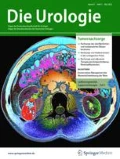Zusammenfassung
Hintergrund
Phosphodiesterase-5- (PDE-5-)Hemmer werden weltweit zur penilen Rehabilitation nach radikaler Prostatektomie eingesetzt. Zuletzt wurde von Michl et al. monozentrisch in einer retrospektiven nicht randomisierten Analyse gezeigt, dass die Einnahme von PDE-5-Hemmern mit einem erhöhten Risiko für ein biochemisches Rezidiv nach radikaler Prostatektomie assoziiert ist. Diese unerwartete und schwere Nebenwirkung wurde anhand eines Patientenkollektivs unserer prospektiv geführten Tumordatenbank im Rahmen einer retrospektiven Analyse hinterfragt und im Kontext der aktuellen Literatur diskutiert.
Material und Methoden
Es wurden 358 Patienten nach radikaler Prostatektomie mit bilateralem Nervenerhalt und ohne neo- oder adjuvante Therapie im Zeitraum von 2004 bis 2015 retrospektiv analysiert. Von diesen nahmen 65,9 % laut eigener Angabe postoperativ regelmäßig PDE-5-Hemmer ein, 34,1 % taten dies nicht. Patienten mit sporadischer Einnahme wurden nicht in die Primäranalyse eingeschlossen. Mittels Kaplan-Mayer-Analyse wurde das rezidivfreie Überleben von Patienten mit vs. ohne PDE-5-Hemmer-Einnahme verglichen (Endpunkt: PSA-Anstieg >0,2 ng/ml oder Salvagetherapie).
Ergebnisse
Bei vergleichbaren klinischen Parametern beider Gruppen zeigte sich kein signifikanter Unterschied im rezidivfreien Überleben (p = 0,9334). 60 Monate postoperativ waren 90,4 % der Männer mit verglichen zu 90,8 % der Männer ohne Einnahme von PDE-5-Hemmern rezidivfrei.
Schlussfolgerung
Trotz vergleichbarem Analysenaufbau konnten die Ergebnisse der Arbeit von Michl et al. in unserem Patientenkollektiv nicht bestätigt werden. In Zusammenschau mit einer Kohortenanalyse aus Skandinavien scheint die postoperative PDE-5-Hemmer-Einnahme sicher zu sein und sollte den Patienten nach kritischer Diskussion nicht vorenthalten werden.
Abstract
Background
Phosphodiesterase type 5 (PDE-5) inhibitors are widely used for penile rehabilitation and treatment of erectile dysfunction after radical prostatectomy. Recently, Michl et al. showed in a monocentric, retrospective and non-randomized analysis that PDE-5 inhibitors may cause higher biochemical recurrence rates after radical prostatectomy. This unexpected and serious adverse side effect of PDE-5 inhibitors was scrutinized on the basis of patients in our prospective tumor database.
Materials and methods
We included 358 patients after radical prostatectomy with bilateral nerve-sparing and without neo- or adjuvant therapy during 2004 and 2015. In all, 65.9% of the patients regularly took PDE-5 inhibitors postoperatively, 34.1% did not. Patients with sporadic use were excluded from the primary analysis. We used Kaplan–Mayer analysis to compare biochemical recurrence rates in both groups (endpoint: PSA > 0.2 ng/ml or salvage therapy).
Results
Both groups showed comparable clinical parameters. There was no significant difference in recurrence-free survival (p = 0.9334): 60 months postoperatively 90.4% of men with PDE-5 intake vs. 90.8% of men without intake of PDE-5 inhibitors were recurrence-free.
Conclusion
Although our analysis was constructed similar to the analysis of Michl et al., we could not confirm their results. Taken together with recent cohort study from Scandinavia, postoperative prescription of PDE-5 inhibitors seems to be safe and should be discussed with patients.

Literatur
Brock G, Nehra A, Lipshultz LI et al (2003) Safety and efficacy of vardenafil for the treatment of men with erectile dysfunction after radical retropubic prostatectomy. J Urol 170:1278–1283
Chavez AH, Scott Coffield K, Rajab HM et al (2013) Incidence rate of prostate cancer in men treated for erectile dysfunction with phosphodiesterase type 5 inhibitors: retrospective analysis. Asian J Androl 15:246–248
Gallina A, Bianchi M, Gandaglia G et al (2015) A detailed analysis of the association between postoperative phosphodiesterase type 5 inhibitor use and the risk of biochemical recurrence after radical prostatectomy. Eur Urol 68:750–753
Goluboff ET, Shabsigh A, Saidi JA et al (1999) Exisulind (sulindac sulfone) suppresses growth of human prostate cancer in a nude mouse xenograft model by increasing apoptosis. Urology 53:440–445
Huber J, Herpel E, Jakobi H et al (2013) Two decades’ experience with a prospective biobank for urologic oncology: research, clinical care, and the patients’ view. Urol Oncol 31:990–996
Jerzak M, Kniotek M, Mrozek J et al (2008) Sildenafil citrate decreased natural killer cell activity and enhanced chance of successful pregnancy in women with a history of recurrent miscarriage. Fertil Steril 90:1848–1853
Koneru S, Varma Penumathsa S, Thirunavukkarasu M et al (2008) Sildenafil-mediated neovascularization and protection against myocardial ischaemia reperfusion injury in rats: role of VEGF/angiopoietin-1. J Cell Mol Med 12:2651–2664
Leapman M (2016) Relationship of phosphodiesterase type 5 inhibitor to biochemical recurrence after definitve therapy of prostate cancer. J Clin Oncol 34(suppl 2):abstr 119
Li WQ, Qureshi AA, Robinson KC et al (2014) Sildenafil use and increased risk of incident melanoma in US men: a prospective cohort study. JAMA Intern Med 174:964–970
Loeb S, Folkvaljon Y, Lambe M et al (2015) Use of phosphodiesterase type 5 inhibitors for erectile dysfunction and risk of malignant melanoma. JAMA 313:2449–2455
Loeb S, Folkvaljon Y, Robinson D et al (2016) Phosphodiesterase type 5 inhibitor use and disease recurrence after prostate cancer treatment. Eur Urol. doi:doi.org/10.1016/j.eururo.2015.12.013
Michl U, Molfenter F, Graefen M et al (2015) Use of phosphodiesterase type 5 inhibitors may adversely impact biochemical recurrence after radical prostatectomy. J Urol 193:479–483
Savai R, Pullamsetti SS, Banat GA et al (2010) Targeting cancer with phosphodiesterase inhibitors. Expert Opin Investig Drugs 19:117–131
Serafini P, Borrello I, Bronte V (2006) Myeloid suppressor cells in cancer: recruitment, phenotype, properties, and mechanisms of immune suppression. Semin Cancer Biol 16:53–65
Vehmas T (2015) Re: use of phosphodiesterase type 5 inhibitors may adversely impact biochemical recurrence after radical prostatectomy: U. Michl, F. Molfenter, M. Graefen, P. Tennstedt, S. Ahyai, B. Beyer, L. Budaus, A. Haese, H. Heinzer, S. J. Oh, G. Salomon, T. Schlomm, T. Steuber, I. Thederan, H. Huland and D. Tilki J Urol 2015;193:479–483. J Urol 194:595–596
Vickers AJ, Sjoberg DD, European U (2015) Guidelines for reporting of statistics in European Urology. Eur Urol 67:181–187
Author information
Authors and Affiliations
Corresponding author
Ethics declarations
Interessenkonflikt
L. Hofer, J.P. Radtke, C. Rapp, S. Pahernik, D. Teber, M. Hohenfellner und B. Hadaschik geben an, dass kein Interessenkonflikt besteht.
Dieser Beitrag ist eine retrospektive Datenanalyse und beinhaltet keine von den Autoren durchgeführten Studien an Menschen oder Tieren.
Rights and permissions
About this article
Cite this article
Hofer, L., Radtke, J.P., Rapp, C. et al. Rezidivfreies Überleben nach radikaler Prostatektomie und PDE-5-Hemmer-Einnahme. Urologe 56, 492–496 (2017). https://doi.org/10.1007/s00120-016-0267-2
Published:
Issue Date:
DOI: https://doi.org/10.1007/s00120-016-0267-2
Schlüsselwörter
- Phosphodiesterase-5-Hemmer
- Prostatakarzinom
- Rezidiv, biochemisches
- Prostatektomie, radikale
- Dysfunktion, erektile

